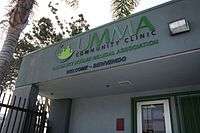UMMA Community Clinic
University Muslim Medical Association (UMMA) Community Clinic is the first Muslim American founded community-based health organization in the United States. Located in South Los Angeles, it has a culturally and religiously diverse staff serving an equally diverse, though underprivileged population.
 | |
| Founded | 1996 |
|---|---|
| Founder | Dr. Nisha Abdul Cader, Dr. Rushdi Abdul Cader, Dr. Mansur Khan, Raziya Shaikh, Ph.D, Dr. Khaliq Siddiq, Aisha Siddiq, Dr. Altaf Kazi, Dr. Charles Sadler, Dr. Rumi Abdul Cader, Fatima Mtume, MPH, Yasser Aman, MPH |
| Focus | Healthcare, Community |
| Location |
|
| Origins | United States, US |
Area served | South Los Angeles (Spa 6) |
History
UMMA was started by a small group of UCLA students in 1991. Their goal: to set up a free clinic for the benefit of an entire community, based on the premise that healthcare is a right and not a privilege. The student founders approached and won the support of the City of Los Angeles; University of California, Los Angeles, and Charles R. Drew University.
They worked with government officials to raise $1.3 million in grants, brainstormed with architects to rebuild a dilapidated structure on Florence Ave. in South Los Angeles, and collected donated equipment.
In September 1996, UMMA Clinic's doors to the community were opened. The students have since themselves become doctors, researchers, and parents.
Over a ten-year period, UMMA's infrastructure has grown considerably; today employing 18 full-time staff, supported by a legion of volunteers.
Since UMMA's birth, over ten Muslim founded charitable health clinics have been established throughout the United States.
Community served
The South Los Angeles region UMMA serves is federally classified as a "Medically Underserved Area" (MUA) meaning that the ratio of physicians to residents falls below federal standards. The region also has the highest number of uninsured residents in Los Angeles County.
The Clinic serves an impoverished but culturally rich population mostly of Latinos and African-Americans. The clinic serves the unemployed, the homeless, and the working poor, where average annual household income is less than $25,000, over 2/3 of the patients meet federal poverty or very low income criteria, 51% of area adults and 28% of children have no health insurance.
An average of 170 patients are seen weekly and the clinic now has a patient population of over 20,000 individuals who have logged over 30,000 visits.
Services include: adult internal medicine, pediatrics, childhood immunizations, on-site mammography, gynecology, adolescent medicine, HIV/STD testing, laboratory services, health education, ophthalmology and dermatology.
Key partnerships
- Kaiser Permanente
- California Wellness Foundation
- California Endowment
- California Community Foundation
Notes
References
Media and research links
- Health Trumps Faith Differences at Muslim Clinic: http://www.latimes.com/news/printedition/california/la-me-beliefs3nov03,0,4415461.story
- Healing South Central: http://www.saudiaramcoworld.com/issue/200703/healing.south.central.htm
- UMMA on KCET’s Life & Times: http://www.kcet.org/lifeandtimes/healthscience.php
- Institute for Social Policy and Understanding (ISPU) Report on Muslim Community-Based Health Organizations: http://ispu.org/reports/articledetailpb-67.html